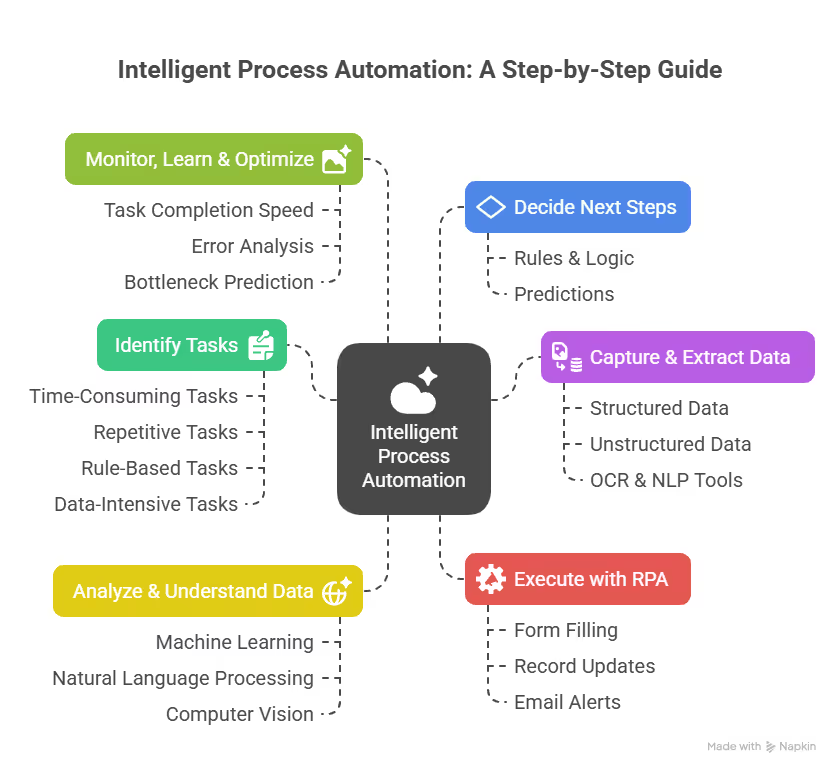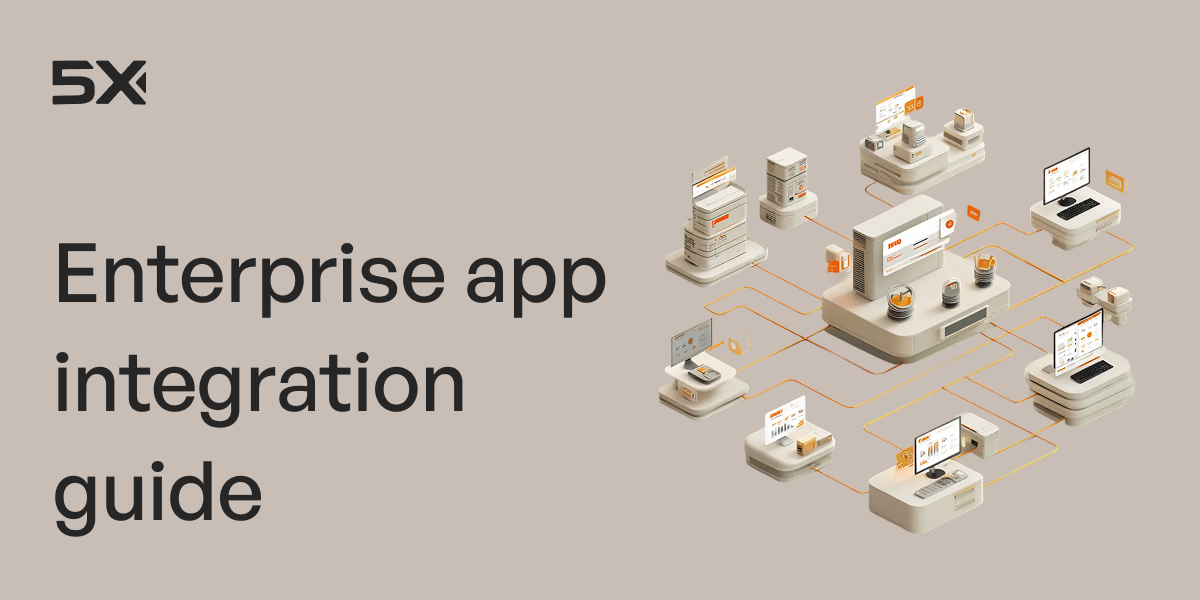Table of Contents
TL; DR
If you're still relying on people to copy-paste data, scan documents, or manually check spreadsheets, you're not just wasting time, you're losing money, accuracy, and your team’s energy.
When you invest in CRMs, ERPs, or analytics tools, but people continue doing repetitive tasks manually, you miss out on what’s possible. Forward-thinking teams are using Intelligent Process Automation (IPA) to move from “better tools” to smarter systems.
Read this blog to understand how IPA works, where to use it, and why it’s a must-have for businesses that want to scale efficiently without burning out people or processes.
Process intelligence has emerged as the hottest new technology, outpacing even AI and hashtag#MachineLearning investments among global enterprises. By harnessing the power of data, process intelligence provides actionable insights into operational pain points, showing you how to turn substandard workflows into superior operation.
Genpact, on LinkedIn
What is intelligent process automation?
Intelligent Process Automation (IPA) combines artificial business intelligence with traditional automation to make business processes smarter and more efficient. Unlike basic automation, which simply follows set rules, IPA can learn, adapt, and improve on its own.
Using IPA is like giving your business process a brain and a pair of hands. It combines Artificial Intelligence (AI) (the brain) with Robotic Process Automation (RPA) (the hands) to automate not just repetitive tasks, but also the thinking behind them.
Here’s what powers IPA:
- RPA handles routine tasks like data entry
- AI brings decision-making and pattern recognition
- Machine Learning helps systems get smarter with every data point
- NLP lets machines understand human language, both text and speech
- Data Analytics turns raw data into real-time insights
How does intelligent process automation work?
Whether you're leading operations at a fast-scaling startup or navigating transformation at a global enterprise, IPA gives you the edge: lower costs, faster turnaround, and smarter decisions. And no, it’s not just about automating the boring stuff (though it’s great at that too).

Here’s how it works, step by step:
- Identify what to automate: You begin by pinpointing which tasks are time-consuming, repetitive, rule-based, and involve lots of data. Common examples: Processing invoices, onboarding employees, responding to FAQs, extracting data from documents
- Capture and extract data: Once you’ve selected a process, the system gathers all the relevant data from different sources such as structured data (Like spreadsheets, CRMS, databases), unstructured data (Like emails, scanned documents, PDFs). tools like OCR (Optical character recognition) and NLP (Natural language processing) Help read and extract information, even from messy or handwritten inputs
- Analyze and understand the data: Now, AI steps in. It uses machine learning (ML) to spot trends and learn from past data, NLP to understand language, and computer vision to interpret images or scanned documents. The system can now find anomalies, classify information, and even predict what should happen next
- Decide next steps: After analyzing the data, the system uses rules, logic, and predictions to decide what action to take. For example, it will approve or reject an invoice, route a customer query to the right team, and flag a suspicious transaction for review. Unlike traditional automation, IA doesn’t just follow instructions, but chooses the best next step
- Execute with RPA: Once the decision is made, RPA bots carry it out. They might fill out forms, update records, send emails or alerts, and trigger another system or workflow. These bots are fast, accurate, and work 24/7
- Monitor, learn and optimize: The system doesn’t stop after the task is done. It keeps monitoring how fast tasks are being completed, analyzes how often errors occur, and predicts where bottlenecks or issues arise. Over time, the AI learns from this data, making the system smarter and more efficient
Benefits of Intelligent Process Automation for Businesses
Intelligent Process Automation (IPA) helps you cut costs, save time, and boost productivity without burning out your team. Here’s how IPA quietly powers better business results every day.
1. Reduce business costs without compromising quality
Cost-cutting is often a priority, but cutting corners is not an option for businesses that want to scale. By automating time-consuming and manual tasks using IPA, companies can successfully and significantly reduce operational costs.
For example, a mid-sized accounting firm can use IPA to automate invoice processing. What previously took a team of five now requires just one person for supervision. This frees up resources and allows the firm to onboard more clients without expanding the team.
Key takeaway: IPA allows you to do more with fewer resources without sacrificing quality.
2. Free up your team for higher-value work
One of the biggest benefits of automation is time.
By handling repetitive, rule-based tasks like data entry, payroll processing, or customer query sorting, IPA can free up as much as 90% of your team’s time.
Most businesses don’t use automation to reduce headcount. They use it to redeploy staff to more meaningful work. Instead of spending hours on data entry, your employees can focus on strategy, relationship building, and creative problem-solving.
Why it matters: Your people aren’t meant to do robotic tasks, robots are. IPA lets your team focus on what only humans can do.
3. Minimize the risk of human error
Human error is a fact of life, especially in repetitive tasks. But the cost of those errors can cost you money and time. Studies show that human error accounts for 82% of production mistakes and up to 70% of electronic system failures.
When automation takes over repetitive processes, the chances of mistakes drop dramatically. Whether it’s copying customer data, processing invoices, or compiling reports, IPA systems follow the rules with full accuracy every single time.
Why it matters: IPA increases accuracy and protects your business from costly rework and compliance.
4. Improve audit readiness and data traceability
Regulatory compliance and audits can be stressful unless every action in your process is traceable.
With intelligent automation, you get an automatic, real-time log of everything your bots do. That means cleaner audit trails, faster reporting, and stronger compliance. This matters because when auditors come knocking, you'll have every process documented accurately.
For example, banks in global companies across the world have used RPA to create a digital audit trail, which helped them avoid regulatory breaches over a few years.
Why it matters: When auditors come knocking, you'll have every process documented accurately.
5. Connect data across systems without switching platforms
Most companies today use multiple systems such as CRM, ERP, accounting tools, email, Excel. However, these tools don’t always communicate well with each other.
IPA acts as a bridge.
It can pull data from one platform and input it into another without manual intervention. That means smoother workflows, less duplicate data, and fewer errors.
For example, a logistics company can integrate SAP and Salesforce using IPA. What used to take 20 hours of manual reconciliation per week now runs in the background error-free and in real time.
Why it matters: IPA helps you to connect your legacy systems without replacing them.
6. Deliver faster service to customers
Customer expectations have changed. They want fast, personalized, and error-free service. Intelligent automation helps you meet those expectations by speeding up back-end processes like approvals, responses, and report generation.
Why it matters: Faster processing leads to happier clients—and happier clients stay longer.
7. Boost employee satisfaction and retention
Repetitive work leads to wasted time and drained motivation. By taking low-value tasks off employees’ plates, IPA improves job satisfaction as they can now focus on strategic, creative, or client-facing tasks, which are not only more impactful but also more fulfilling. Higher satisfaction often leads to better retention, saving you the cost of frequent hiring and training.
Why it matters: IPA can also be used internally to send automated reminders for training sessions, feedback surveys, or company events, thus improving the employee experience overall.
Examples of intelligent process automation across industries
Intelligent Process Automation (IPA) is no longer just a back-office upgrade. It's become a strategic driver of efficiency, accuracy, and growth across industries.
Here’s how different sectors are putting it to work.
Banking and finance
Banks use IPA to speed up processes, reduce risk, and improve compliance. One major impact is in fraud detection where automation has helped institutions cut fraud losses by up to 30%.
IPA also automates loan approvals by validating documents, checking credit history, and flagging inconsistencies. For compliance teams, it automates the generation and submission of regulatory reports, reducing the risk of oversight or manual errors. As a result, banks can offer faster service while staying secure and compliant.
Healthcare
In healthcare, IPA reduces administrative paperwork and improves patient care. IPA pulls up patient data, verifying insurance details, and updating records automatically. It automates patient admissions, billing, and insurance claims, cutting down errors and wait times.
Beyond administrative functions, intelligent automation also plays a role in clinical decision-making. AI-powered analytics can analyze lab results, identify patterns in patient history, and even recommend potential treatment options, helping deliver more personalized and accurate care.
Retail
Retailers use IPA to manage inventory, predict demand, and improve customer experiences. Automation ensures stock is replenished in time, orders are processed quickly, and marketing is tailored to each customer. Even basic customer service tasks like tracking orders or answering FAQs are now handled by chatbots, improving speed and satisfaction.
Manufacturing
Manufacturing companies rely on IPA to minimize downtime and improve quality. Predictive maintenance alerts teams before equipment fails. Automated quality checks flag defects early.
On the production floor, automation monitors quality metrics in real time and flags deviations that may affect product standards. In supply chain operations, IPA ensures that procurement, inventory tracking, and vendor communications happen smoothly and with minimal manual effort.
Human resources
As remote and hybrid work become the norm, HR teams are handling more responsibilities than ever before. IPA offers a way to reduce administrative overload and refocus attention on strategic initiatives like employee engagement, talent development, and organizational culture.
One of the most common applications is in recruitment and onboarding. Bots can scan resumes, schedule interviews, and even send welcome emails automatically. For payroll teams, automation ensures timely salary disbursements and correct tax deductions with minimal errors.
Performance reviews, training compliance, and benefits administration can also be streamlined using IPA. HR professionals no longer need to chase down paperwork or manually manage spreadsheets. Instead, they can focus on creating better employee experiences and improving retention.
Automate smarter with 5X
Most automation tools help you eliminate a few repetitive tasks. 5X helps you eliminate inefficiency across your entire organization by automating entire workflows intelligently.
By combining AI, process automation, and unified data, 5X data platform helps businesses streamline operations across departments, not just within them. From marketing to finance, it connects systems and eliminates manual inefficiencies. 5X's IPA solution kit uses AI to optimize workflows, predict bottlenecks, and continuously improve process efficiency based on real-time data analysis.
Whether it’s invoice automation, data syncing, or reporting, 5X picks up all your scattered data using 500+ prebuilt connectors and gets your first use case live in just 48 hours. If you're looking to scale automation without adding more tools or headcount, use 5X to do more with less friction.
Building a data platform doesn’t have to be hectic. Spending over four months and 20% dev time just to set up your data platform is ridiculous. Make 5X your data partner with faster setups, lower upfront costs, and 0% dev time. Let your data engineering team focus on actioning insights, not building infrastructure ;)
Book a free consultationHere are some next steps you can take:
- Want to see it in action? Request a free demo.
- Want more guidance on using Preset via 5X? Explore our Help Docs.
- Ready to consolidate your data pipeline? Chat with us now.

How retail leaders unlock hidden profits and 10% margins
Retailers are sitting on untapped profit opportunities—through pricing, inventory, and procurement. Find out how to uncover these hidden gains in our free webinar.
Save your spot









%201.svg)


.png)






